Related Research Articles

Cardinals are the most senior members of the clergy of the Catholic Church, being second in precedence only to the Pope. They are appointed to the rank of cardinal in addition to their existing position within the Church. Collectively, they constitute the College of Cardinals, and are appointed for life.
Canon law is a set of ordinances and regulations made by ecclesiastical authority, for the government of a Christian organization or church and its members. It is the internal ecclesiastical law, or operational policy, governing the Catholic Church, the Eastern Orthodox and Oriental Orthodox churches, and the individual national churches within the Anglican Communion. The way that such church law is legislated, interpreted and at times adjudicated varies widely among these four bodies of churches. In all three traditions, a canon was originally a rule adopted by a church council; these canons formed the foundation of canon law.
The Roman Curia comprises the administrative institutions of the Holy See and the central body through which the affairs of the Catholic Church are conducted. It acts in the pope's name and with his authority for the good and for the service of the particular churches and provides the central organization for the church to advance its objectives.
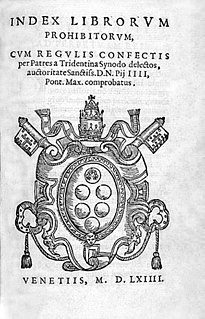
The Index Librorum Prohibitorum was a list of publications deemed heretical or contrary to morality by the Sacred Congregation of the Index, and Catholics were forbidden to read them without permission.

The highest-ranking bishops in Eastern Orthodoxy, Oriental Orthodoxy, the Catholic Church, and the Church of the East are termed patriarchs.
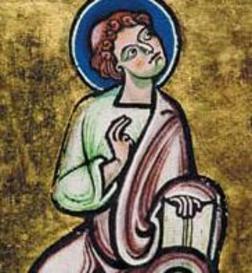
Ivo of Chartres, also known as Saint Ivo in the Roman Catholic Church, was the Bishop of Chartres, France from 1090 until his death, and an important canonist during the Investiture Crisis.
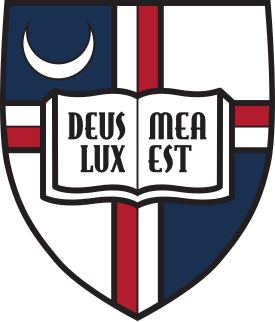
The Catholic University of America (CUA) is a private Catholic university in Washington, D.C. It is a pontifical university of the Catholic Church in the United States and the only institution of higher education founded by U.S. Catholic bishops. Established in 1887 as a graduate and research center following approval by Pope Leo XIII on Easter Sunday, the university began offering undergraduate education in 1904. Its campus is adjacent to the Brookland neighborhood, known as "Little Rome", which contains 60 Catholic institutions, including Trinity Washington University, the Dominican House of Studies, and Archbishop Carroll High School, as well as the Basilica of the National Shrine of the Immaculate Conception.
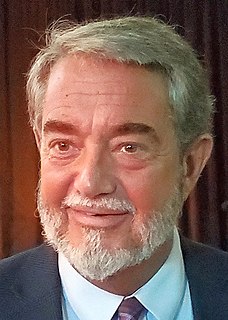
Scott W. Hahn is an American Catholic theologian and apologist. A former Presbyterian who converted to Catholicism, Hahn's popular works include Rome Sweet Home and The Lamb's Supper: The Mass as Heaven on Earth. His lectures have been featured in multiple audio distributions through Lighthouse Catholic Media. Hahn is known for his research on Early Christianity during the Apostolic Age and various theoretical works concerning the early Church Fathers.

Thomas Joseph Shahan was an American Catholic theologian and educator, born at Manchester, New Hampshire, educated at Collège de Montréal (1872) at the Pontifical North American College, and at the Propaganda in Rome.
Doctor of Canon Law is the doctoral-level terminal degree in the studies of canon law of the Roman Catholic Church. It can also be an honorary degree awarded by Anglican colleges. It may also be abbreviated ICD or dr.iur.can., ICDr, DCL, DCnl, DDC, or DCanL. A doctor of both laws is a JUD or UJD.
The canon law of the Catholic Church is the system of laws and legal principles made and enforced by the hierarchical authorities of the Catholic Church to regulate its external organization and government and to order and direct the activities of Catholics toward the mission of the Church. It was the first modern Western legal system and is the oldest continuously functioning legal system in the West, while the unique traditions of Oriental canon law govern the 23 Eastern Catholic particular churches sui iuris.
Licentiate of Canon Law is the title of an advanced graduate degree with canonical effects in the Roman Catholic Church offered by pontifical universities and ecclesiastical faculties of canon law. Licentiate is the title of a person who holds an academic degree called a licence. The licentiate of canon law is the ordinary way for forming future canonists, according to Veritatis gaudium.

Gabriele Paleotti was an Italian cardinal and Archbishop of Bologna. He was a significant figure in, and source about, the later sessions of the Council of Trent, and much later a candidate for the papacy in 1590, and is now mostly remembered for his De sacris et profanis imaginibus (1582), setting out the Counter-Reformation church's views on the proper role and content of art.
John Denver Faris is an American Chorbishop of the Syriac Maronite Church of Antioch, serving the Maronite Catholic Eparchy of Saint Maron of Brooklyn, headquartered in Brooklyn, New York. He is a canon lawyer of the Eastern Catholic Church, and an expert called upon for dialogue between the Catholic Church and the Eastern Christian Churches.
Liturgiam authenticam is an instruction of the Congregation for Divine Worship and the Discipline of the Sacraments, dated 28 March 2001.
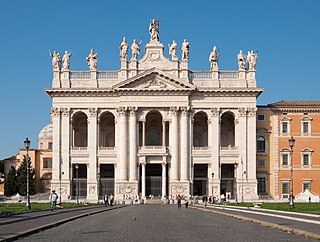
The Latin Church, also known as the Roman Catholic Church or the Western Church is the largest particular church sui iuris of the Catholic Church, and employs the Latin liturgical rites. It is one of 24 such churches, the 23 others forming the Eastern Catholic Churches. It is headed by the bishop of Rome, the pope – traditionally also called the patriarch of the West – with his cathedra in this role at the Archbasilica of Saint John Lateran in Rome, Italy. The Latin Church traces its history to the earliest days of Christianity through its direct leadership under the Holy See that according to Catholic tradition was founded by Peter and Paul.
The Jurist: Studies in Church Law and Ministry or simply The Jurist is a peer-reviewed academic journal and the only journal published in the United States devoted to the study and promotion of the canon law of the Catholic Church. It was initiated in 1940 to serve the academic and professional needs of Catholic church lawyers. It originally focused on the canon law of the Latin Church, but came to include Oriental canon law as well.
Pheme Perkins is a Professor of Theology at Boston College, where she has been teaching since 1972. She is a nationally recognized expert on the Greco-Roman cultural setting of early Christianity, as well as the Pauline Epistles and Gnosticism.
The Eastern Catholic canon law is the law of the 23 Catholic sui juris (autonomous) particular churches of the Eastern Catholic tradition. Eastern Catholic canon law includes both the common tradition among all Eastern Catholic Churches, now chiefly contained in the Code of Canons of the Eastern Churches, as well as the particular law proper to each individual sui juris particular Eastern Catholic Church. Oriental canon law is distinguished from Latin canon law, which developed along a separate line in the remnants of the Western Roman Empire, and is now chiefly codified in the 1983 Code of Canon Law.
The School of Canon Law is the only faculty of Catholic canon law in the United States. It is one of the twelve schools at The Catholic University of America, located in Washington, D.C. and one of the three ecclesiastical schools at the university, together with the School of Theology and Religious Studies and the School of Philosophy. The school is part of the main campus in the Brookland neighborhood in Northeast D.C. and is housed in Caldwell Hall. It offers the Licentiate of Canon Law and the Doctor of Canon Law ecclesiastical degrees, as well as civil and joint ecclesiastical-civil degree programs.
References
- ↑ Contact Us
- ↑ "Eurospan - University Presses". Archived from the original on 2017-12-27. Retrieved 2017-12-27.
- ↑ Roy J. Deferrari Memoirs of the Catholic University of America 1918-1960 (Boston: Daughters of St. Paul, 1962) p. 200